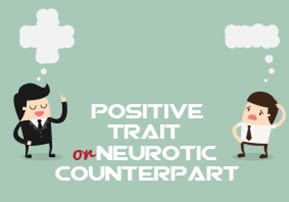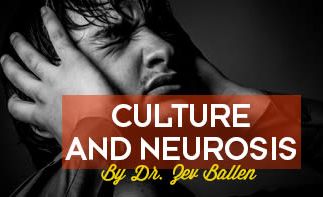
Positive Trait or Neurotic Counterpart
It isn’t so terribly important that people should like us. It’s important that we are liked by our families, by those we care about, by those we have to live with...

The woman was the epitome of generosity, self-sacrifice and kindness. Her every thought was for her husband, her children, her neighbors, her relatives. She wanted to please people and feel approved of by them so she did everything that she could to fulfill their expectations. When she reached the limit of her resources and could do no more for someone in need, she dreaded the slightest sign that the person was disappointed in her efforts.
Most of all she dreaded that her husband would abandon her for not doing enough for him. So she couldn’t assert her needs at all with her husband. Finally, when her health took a turn for the worse and she was forced to stop her “kindness” to others, she literally didn’t know what she felt, what she thought, what she liked and disliked, what she believed in or even who she was anymore.
Most of us wish to be liked. We enjoy feelings of gratitude when we are liked and feel some resentment when we are not liked – this in itself is not neurotic. For a child, the feelings of being wanted are of vital importance for his harmonious development. But when would the need for affection be considered neurotic?
My description of the woman above is one of a strikingly neurotic person. Yet there was absolutely nobody  in this woman’s life who noticed her deteriorating condition before it was too late. How could this be? How could such a desperate, compulsive, and indiscriminate need for affection go unnoticed, especially by those who were closest to her?
in this woman’s life who noticed her deteriorating condition before it was too late. How could this be? How could such a desperate, compulsive, and indiscriminate need for affection go unnoticed, especially by those who were closest to her?
For the neurotic person, obtaining love and approval is not a luxury but a vital necessity. The difference is one between “I wish to be, and enjoy being, loved,” and “I must be loved at any cost”; or the difference between someone who eats because he has a good appetite, can enjoy his food and be careful about what he eats, and another person who is near starvation, must grab any food he can find, and pay any price for it.
Unfortunately the woman above is an all too common prototype in religious communities. A religious community holds the ideals of selfless kind-hearted self-sacrifice and the doing of good deeds in the highest regard. We naturally admire and respect people who seem to be living up to the Torah ideal of caring for orphans, widows, and others who need various kinds of help and support. These powerful religious and cultural factors influence us to view the self-sacrificing person as the epitome of what we should all be striving to be.
In reality, it isn’t so terribly important that people should like us. It’s important that we are liked by our families, by those we care about, by those we have to live with or work with or with certain people who we need to impress for some expedient purpose. Apart from such people it doesn’t really matter if we are liked or not. This idea may be disagreeable to the American mentality because of cultural factors that enter into the picture. In American society, being popular has become one of the competitive aims that people strive for that doesn’t exist in other countries to the same degree.
We are living in a generation that is very far removed from G-d. The atheistic movement has left in its wake an epidemic of psychological disorders which were unheard of in our great grandparent’s generation. By necessity we must learn more about the neurotic personality of our era so we can differentiate it from the healthy personality characteristics that the Torah encourages us to develop and help neurotic people to not become even more neurotic by using the Torah in unhealthy ways. We are in the very beginning of a process of educating ourselves in this area but at least we have begun.












2/21/2016
Brilliant food for thought.
I love your straight-talk, given over in such a compassionate manner. You made some very thought-provoking points here. Thank you.
2/21/2016
I love your straight-talk, given over in such a compassionate manner. You made some very thought-provoking points here. Thank you.